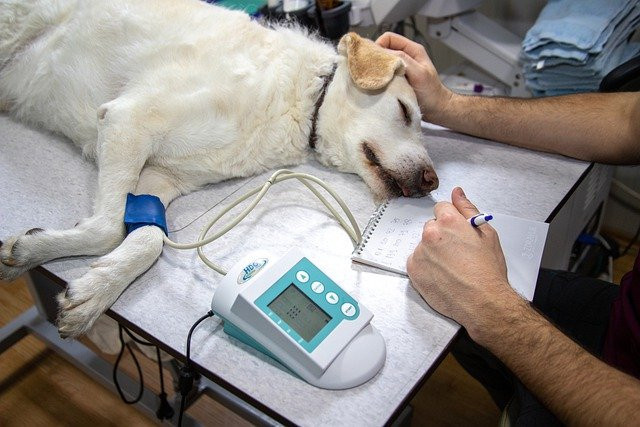Recently, multiple cases of dilated cardiomyopathy (DCM) in dogs are being reported by veterinarians at UC Davis and other locations. DCM is a type of heart disease where the heart becomes enlarged and weakened, resulting in a reduction of ability to pump blood efficiently. Some of these cases seem to be related to nutrition. Dog food may actually be causing heart disease. Many of these diets are grain free.
A New Take On An Old Problem
Unfortunately, DCM is not a new disease in dogs. Certain breeds are known to be predisposed to it, so there is definitely a genetic component. However, a new development is that a number of cases of DCM have been identified in dogs that appear to be associated with consumption of commercial diets containing ingredients such as legumes and root vegetables. Examples of these ingredients are peas, lentils, beans and potatoes. Many of these popular diets are marketed as “grain free”. There may be a connection between the diets and low taurine levels in some dogs. Taurine is an important amino acid, and low levels have been associated with DCM in dogs. Amino acids are the building blocks of protein.
Multiple veterinary cardiologists and nutritionists are examining this issue, and have not come to a consensus as to the definitive cause, or if in fact there is a definite connection between the diets and DCM in dogs. However, there is enough mounting evidence that on July 2018, the FDA issued an alert to pet owners, and is conducting its own investigation. That information was further updated on June 27, 2019.
What You Should Do Now
Naturally, pet owners reading this article will want to know what they should do right now. Research is currently ongoing. The verdict is still out on whether dogs are getting DCM from the food they are eating. It is likely that the cause will turn out to be multi-factorial. For example, a dog that is a breed already known to be at risk for DCM genetically and is eating a grain free diet might be at increased risk for development of heart disease. This is just one possible example, as some recent cases are in breeds not typically known to get DCM.
Until more of a definitive consensus emerges from ongoing research, I recommend the following.
- If your dog is currently on a grain free diet or a diet with large amounts of legumes or root vegetables, and is healthy, consider changing the diet to one that meets AAFCO nutrient profiles and does not contain legumes or root vegetables. Reference to AAFCO standards should be on the food label.
- If you do not want to change your dog’s diet until more information becomes available, consider taurine supplementation. Taurine is safe, relatively inexpensive and widely available. Consult with your veterinarian for the dose appropriate for your dog.
- If your dog has been on one of the diets of concern for some time, you may want to consider an echocardiogram, which is an ultrasound of the heart and the best way to diagnose DCM.
- It is also possible to test blood taurine level to determine if that is low.
- If your dog has not been getting regular physical exams by your veterinarian at least annually, schedule a visit.
Keep Up To Date (IMPORTANT LINKS)
It is important for all dog owners that have fed or are feeding diets of concern to keep abreast of information as research and investigation continues.
I recommend you check these monthly for updates
Make Sure To Avoid These Ingredients
INGREDIENTS TO AVOID: peas, lentils, beans, other legume seeds, or potatoes (white and sweet).
As dogs don’t need any of the above ingredients in their diet, at this time it seems simplest to avoid them.
Some Sample Brands
The following are sample brands that are high quality and have been reviewed for ingredients of concern. This is not a complete list of these types of diets. The most important factors are that a dog’s diet meet AAFCO standards and not contain the ingredients of concern listed above, as well as being high quality.
- Evangers Chicken & Rice
- Natural Balance Lamb & Rice
- NutriSource Adult Chicken and Rice
- NutriSource Lamb Meal & Rice
- Victor Performance
- Victor Beef Meal & Brown Rice
Conclusion
Dog owners tend to get extremely loyal to certain brands of food. That is understood.
However, in this case I recommend you err on the side of caution and make sure to avoid ingredients of concern until more answers are available. It could be years before that happens, and in the meantime I see no need to risk your dog’s health.
***UPDATE***
I have updated information, as research is ongoing. See HERE.

Where would I find low calorie dog food with the good quality nutrition
Great question. First I would select a quality brand that doesn’t contain the ingredients of concern. I have some sample brands above. Then within those brands, I would look at low calorie versions. These may be labeled in different ways, such as Weight Loss, Moderate Calorie, Low Calorie. Even Senior is a good option as long as your dog is at least one year old. Senior foods generally are lower calorie than “maintenance” diets.
Double check that the low calorie version also doesn’t contain ingredients of concern.
I noticed that some brands of dog food have alfalfa towards lower end of ingredients. Alfalfa is a legume so am wondering if it is also considered as unsafe due to possible heart conditions.
This is another great question. I’m going to have to research this and post back when I find the answer.